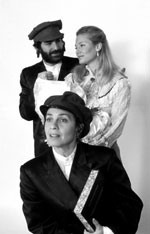|  Yentl,
A Heart-Warming Play for the Holidays Yentl,
A Heart-Warming Play for the Holidays
By Pola Rosen, Ed.D.
Even
if you don’t understand Yiddish, (headphones with simultaneous
translation are provided for those who need them) Yentl transcends
language, time and place. Its theme deals with the place of women
in a society that views them as “married with children,” the old
“Kirchen, kuchen, und kinder” that allows no room for following
a profession or being a scholar. Just as Edna in Kate Chopin’s
1901 novel The Awakening, Yentl, cast in a religious community
of the 1870’s in Russia, needs intellectual stimulation and wants
more than anything, to be a Talmudic scholar. Edna has to leave
her husband and children to find personal fulfillment; Yentl has
to “pass” as a young boy to enter the realm of scholarship. She
weeps as she cuts her hair to look like a boy but is determined
to proceed with her plans. The pathos and conflict in wanting
to please her parents and yet pursue her dreams is rendered most
poignantly by Eleanor Reissa.
A comedy of errors of sorts ensues when Yentl falls in love with
one of her fellow students and is teased for not going swimming
in the nude with all the male students. The subterfuge continues
when one of the prettiest and wealthiest girls in town falls in
love with “him” and a marriage takes place. The hugging, kissing
and warmth between Yentl and her/his bride lead to the resurfacing
of the triangle of Yentl, the wife and the Yeshiva student.
This play, written by Nobelist Isaac Bashevis Singer, and performed
in Yiddish with perfect accents (this reviewer speaks Yiddish
fluently), is just as timely today as when it was written
in 1962. For anyone interested in the passage of women in our
society, Yiddish or not, this play is “the thing”—moving, evocative
and riveting.#
For
tickets: (212)307-4100; for lectures, children’s theater (in English)
and other events see www.folksbiene.org

Education
Update, Inc., P.O. Box 20005, New York, NY 10001.
Tel: (212) 481-5519. Fax: (212) 481-3919.Email: ednews1@aol.com.
All material is copyrighted and may not be printed without express
consent of the publisher. © 2002.
|

